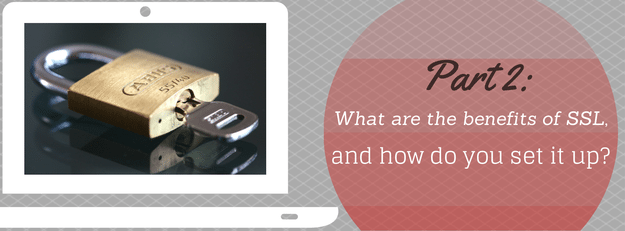And how do you get your site SSL certified?
In our previous post we discussed what SSL certification is, how it works, and how it appears to a visitor to your site. Feel free to take a look! For a quick summary, though, SSL (Secure Socket Layer) is a protocol that encrypts any data traveling between a users browser, and the web server hosting the site they are visiting.
For a simple analogy, if you imagine the connection between your browser and a site as a pipeline for data, an unsecured (regular http://) site is like having a pipe made of glass, where an outside observer can easily see what’s being communicated between the two. SSL is like having a coating on the pipe that prevents outsiders from seeing the data as it is sent back and forth. With that over-simplification out of the way, let’s get to the main topics of our post: What are the benefits of SSL Certification, and how is it set up?
What are the benefits of SSL certification?
1. Security for both parties
SSL provides security for both the visitor and the site owner or business with a very important security. The visitor’s personal information and data is secure, and the business owner’s site, (which frequently represents a serious financial investment), is protected from malicious attacks from hackers and other deviants.
2. Confidence and trust boost
If your site is going to require the exchange of any sensitive information, e-commerce, or even simple account setup, visitors may feel nervous unless your site prominently displays it’s SSL certification in the form of an https at the start of the URL, or the secure icon (usually a lock). If you’ve gone through the effort of creating a brand or product, and building a website, the relatively low extra effort of becoming SSL certified is certainly worth the effort.
3. Search engine ranking boost
Google recently announced that secure sites might see a rankings boost compared to unsecured ones. It makes sense that a site with trusted and secure content should outrank similar content that is not secured. This search engine rankings boost for SSL secured sites is apparently fairly subtle, but in a competitive niche, every little advantage helps.
How do you set up SSL Certification?
SSL certification can be complicated, and requires the completion of the following steps:
Buy an SSL Certificate: These can be purchased from many different sources, often your web hosting company will offer SSL certificates, if not, you can purchase one elsewhere and then bring in your hosting company for help.
Generate a Certificate Signing Request(CSR): This needs to be done by the book, and can be quite a complex process.
Enter the CSR with the service that you purchased the SSL Certificate from: This is necessary information in order for the SSL company to successfully complete the certification.
Transferring your site to a dedicated IP: Part of ensuring your site is secure is making sure that it’s located on an IP that is safe and allows visitors to access it risk free.
Installing the SSL certificate on your site: Finally, the SSL certificate is installed on your site so your visitors, (and the search engines) can see it, and shop or leave personal information with confidence!
Probably the easiest way to get your site SSL certified though is to contact your local web professionals, and have them take care of it for you! Thrive Internet Marketing would be more than happy to help you get your site SSL certified. Why not contact us today!
Contact Thrive to discuss SSL Certification or Read Part 1, What is SSL certification?
Guest Author: Jonathan Jenkins is an SEO professional and content writer in Cape Town, South Africa. He enjoys staying on top of the ever-shifting industry he works in, playing soccer, and evenings spent by the grill.








